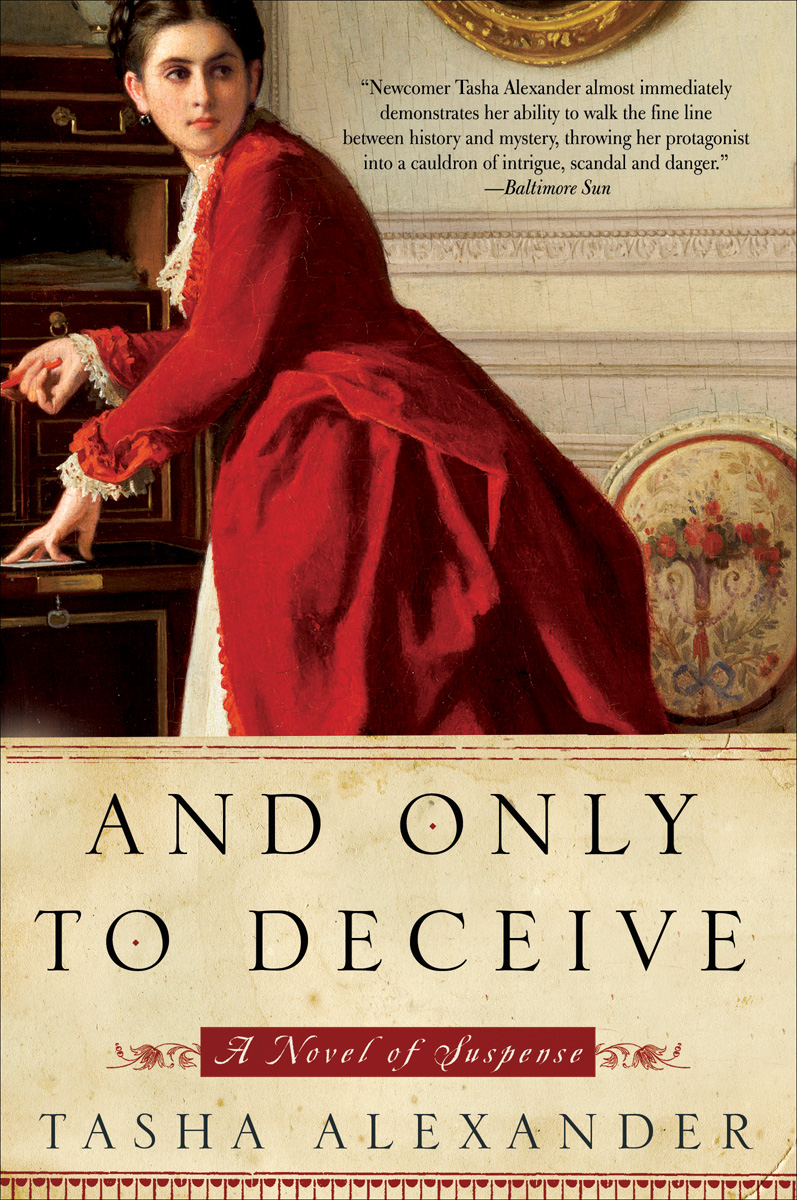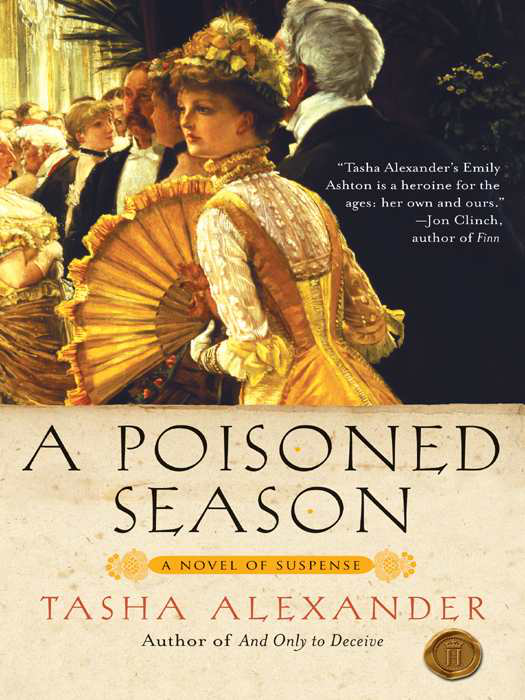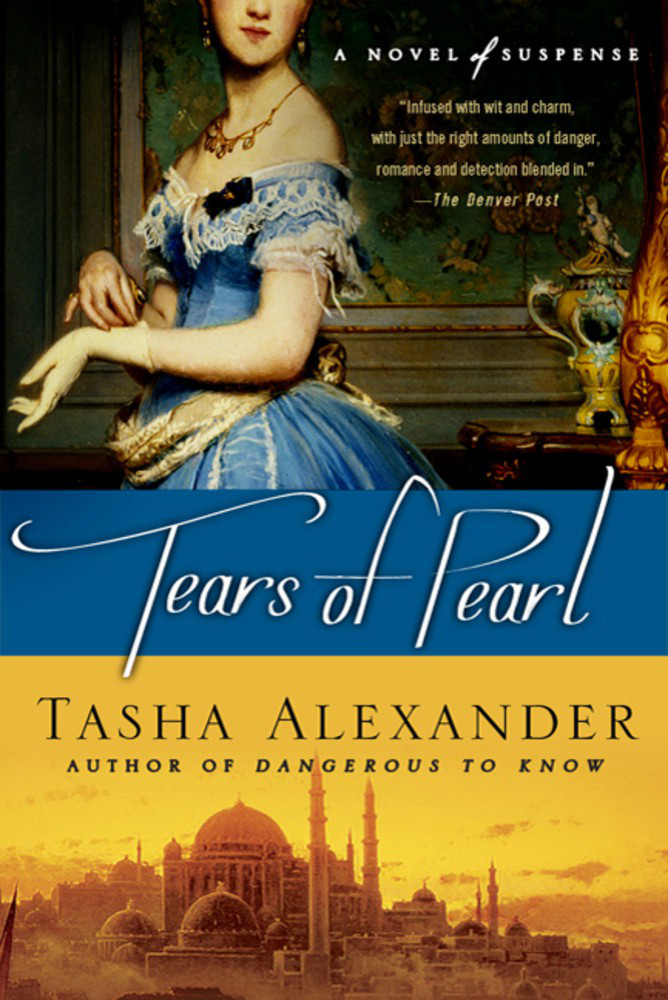Tasha Alexander
Books: Mystery | Historical | Romance
Lady Emily: And Only to Deceive (2005), A Poisoned Season (2007), A Fatal Waltz (2008), Tears of Pearl (2009), Dangerous to Know (2010), A Crimson Warning (2011), Death in the Floating City (2012)
Lady Emily
And Only to Deceive (2005)
Set in England (and Paris) ~1889
The deception in this book? The text, "A Novel of Suspense."
I've been in the mood for historical mysteries, and so when this one came up recommend on Amazon--and on sale--I decided to try it.
My feelings when reading this book kept swinging between annoyance and hopeful interest. Unfortunately, as a mystery, I have to say that this book rates more on the annoyance scale. Which is too bad, because if this book have been categorized differently I think I might have enjoyed it a lot more.
Emily married Philip Ashton primarily to escape her mother who wanted her daughter to find a grand match. Philip seemed nice enough and spent a great deal of time away from home on hunting trips, which allowed her time to read and do as she pleased. But her plans for her life are thrown awry when soon after her wedding, her husband dies while on a safari in Africa. Following society's rules, she must now go into mourning for two years, meaning she can only wear black and gray, cannot dance, and must generally live a sheltered life until her period of mourning is over.
Everyone comes to offer her their condolences, but she hardly knew the man to who she was wed, so despite the fact she feels little sorrow at his death, she must pretend to be the grieving widow. But something strange happens; as she reads her late husband's papers and learns more about his pursuits and interests, she becomes interested in this man she hardly knew, and slowly finds herself falling in love with him. But what she also discovers in these papers is that this man who intrigues her so in death may have lead a far different life from the one she believed.
I was expecting mystery and suspense, but what I got was romance and introspection. And I actually quite liked the introspection. However, I found it completely obvious who the bad guy was, and also who the heroine was going to fall in love with. So that pretty much removed the suspense from the story for me. Because of COURSE the heroine would never have the bad taste to fall in love with a cad and a criminal.
"Please do not imagine I think less of you after hearing your confession. On the contrary, I admire your honesty." He put his hand lightly on my cheek and left.
I remained standing for a moment after he departed, and placed my hand where his had rested on my cheek; it was as if I could still feel his touch.
Bah.
I think what frustrated me the most was that several times I thought, "Hey! She's doing something clever here!" and regained interest in the mystery, only to discover, no, not really clever.
But as I said, as a story--but not as a mystery--this book worked on several levels. The characters were interesting and the writing was good. It was only the mystery I found lacking. The part of the story I found most interesting was Emily's discovery of her husband and his interests, and how her feelings for him changed and evolved as she discovered who he was. It was very interesting to see her build up an idealized version of the man who was her husband, and then be confronted with the reality of who her husband had actually been.
If you're looking for a good mystery, look elsewhere. If you're looking for an interesting story but not expecting mystery or suspense, then you may want to check out And Only to Deceive
Set in England (and Paris) ~1889
The first time I read this book (soon after its publication) I didn't like it. I felt it was more romance than mystery, and I wasn't interested in reading a kissing book.
Upon later reading, knowing what I was going to be reading, I enjoyed it much more, and the mystery was much better than I had remembered.
So after finishing the 2nd Lady Darby mystery, I wanted more historical mysteries, so I came back to this.
Lady Emily was widowed soon after her marriage, and so had to go into deep mourning for a man she barely knew. But for a woman, widowhood was also a freedom–she was no longer subject to her family but instead could make her own decisions–within reason however, if she wanted to remain in the good graces of society.
Why would this be a good situation for a woman?
From the day the queen kissed me during my presentation at court in Buckingham Palace, I heard from Mother constant reminders that my looks would soon fade, and she admonished me to do my best to catch a husband immediately.
"No one questions Philip's excellent character. I only ask that you remember he is dead."
"I know that quite well," I said sharply.
"I think it's what makes him so appealing to you. After all, he's not here to tell you to keep within the confines of good society."
"Well, that certainly doesn't hurt," I admitted, my good temper slowly returning.
"Emily, what Americans consider acceptable is often questionable at best. Miss Seward's influence on you is distressing. She is taking you down a path that can lead to no good. You have been attending lectures, child. Have you lost all sense of decorum?"
My goodness! Attending LECTURES of all things!
But I think that Emily's relationship with her mother is a good reminder of precisely how society constrained a woman.
Published by HarperCollins
- April 2007 | Rating: 6/10
Nov 2012 | NR
February 2016 | Rating: 7.5/10
A Poisoned Season (2007)
 Set in London ~1890
Set in London ~1890
I read the first book in this series several years ago, and was singularly unimpressed. Not the writing or the characters, but because it was (like this book) subtitled: A Novel of Suspense.
I still disagree with that subtitle, but after enough time had passed, I decided to read the second book, keeping in mind that what I was picking up was a romance rather than a mystery.
That made the book much more enjoyable this time around.
Lady Emily is dreading this social season–the first season in which she could participate since the untimely death of her husband in the first book. She likes to dance, but finds much of the socializing rather tedious, and would prefer to spend time curled up in her home learning Greek.
Making a splash this season is a gentleman who claims to be the descendent of Marie Antoinette and Louis XVI. And while this gentleman is parading around claiming to be their heir to the French throne, someone is breaking into houses and stealing items associated with Marie Antoinette
And then there's Colin. Emily loves Colin, but is resisting getting remarried, because she enjoys being independent and doesn't want to bow to societies whims.
Mystery was okay. What I found most interesting was Emily's place in society. As a widow, she remained on her late husband's estates only at the sufferance of his family–once a nephew was old enough, she would be (gently) removed from the house.
It was a very startling reminder that things are very different now than they were then–that as a wife/widow the estates belonged to the family and she remained there only because they allowed her to do so.
Once again making me glad I live in the future.
As with the previous book, the focus was primarily upon the romance. The characters were interesting which made up for the mystery not being particularly strong.
So, and interesting diversion and escape.
---
The second Lady Emily mystery finds Lady Emily Ashton still trying to find her place in society as a widow, and battling her mother's domineering attempts to get Emily remarried.
Emily is still refusing Colin Hargreaves offer of marriage, but not because she doesn't love him, but because she values the independence she has come to know as a widow (despite her mother's vociferous disapproval).
A claimant to the French throne (the lost (great) grandson of Marie Antoinette) is attempting to gain the support of the French government, even though there is long longer a French monarchy. (Pesky details.) The presumptive heir is a cad and a boor, but his possible position gives him political power and people put up with him, just in case he does gain the throne.
But someone is stealing items that once belonged to Marie Antoinette–and that person doesn't seem to be the current claimant. And when one of the owners from whom an item was stolen is found murdered, Lady Emily becomes even more curious–and involved.
This is the second historical mystery involving a lost heir to the French monarchy I've read this year. I have to admit I prefer C.S. Harris' writing and story telling, but this wasn't bad. And it wasn't a particularly uncommon occurrence.
I do like Lady Emily, and especially enjoy her wit.
"And, Emily"—he grew serious—"if you ever…if Hargreaves doesn't…if you do need someone…I think you and I could come to a mutually satisfactory understanding."
"Really, Jeremy, that has to be one of the most romantic proposals in all of English history. May I record it in my diary?"
"I mean it, Em."
Poor Jeremy.
Never mind the fact that Jeremy and Margaret concoct a plan to keep things easier during the Season, when both are expected to be searching out eligible suitors–whether they want to or not.
Besides—and I know you will take no offense at this, Margaret, darling—she would die before seeing me marry an American. She's never forgiven the colonists for leaving the empire."
"Ah!" Margaret cried. "Perfect! That is what will end our affair. I'm devastated already."
I think what I particularly like about this series is the constant struggle between personal desire and societal expectations.
Published by HarperCollins
- August 2012 | Rating: 6.5/10
- August 2014 | Rating: 7/10
- February 2016 | Rating: 7/10
A Fatal Waltz (2008)
Set in 1891
 Lady Emily's marriage to Colin Hargreaves was put off when Lord Fortescue arranged to have Hargreaves sent overseas on a mission. Fortescue opposes Emily's marriage to Colin and will do everything possible to end their engagement.
Lady Emily's marriage to Colin Hargreaves was put off when Lord Fortescue arranged to have Hargreaves sent overseas on a mission. Fortescue opposes Emily's marriage to Colin and will do everything possible to end their engagement.
Thus it is with some surprise that Lady Emily finds herself invited to a party at Lord Fortescue's country estate.
This one actually had more mystery than romance, which I liked. I also liked the trip to Vienna–both seeing historical Vienna and the fact that Lady Emily saw for the first time how the poor in Europe truly lived.
I did have a couple problems with the way a couple of the characters acted–especially Schroder. (If Lady Emily mentioned the name of who she was helping, I have a hard time believing he would have helped her.) But, it was a small thing in a rather complicated (though enjoyable) plot.
You should be able to read this story even if you haven't read any of the previous books.
---
The third Lady Emily book finds Emily engaged to Colin Hargreaves, however, his work has caused their wedding to be put off, and now Lord Fortescue is doing everything he can to break their engagement for he doesn't like Emily, and believes Colin's work is too important for him to be distracted by one such as Emily.
Great guy.
Lots and lots of adultery here, especially in Vienna, where apparently it was quite common. Which, in a way, makes sense. If the majority of the upper class were forced into marriages arranged for prestige or fortune or power, why not take love–or at least romance–where it can be found.
But it is somewhat shocking, even to the modern reader, how common these affairs were, and how well-known they were.
"I don't know a single person in Vienna who is not having an affair. If you don't have a paramour by the end of the evening, you'll have no one to blame but yourself."
And again, poor Jeremy.
"So are we to spend the rest of the morning in church?"
"It will be good for your soul, Jeremy." We sat quietly for approximately three minutes.
"I'm bored," he said.
"Your attention span is astonishing.
Readers–unlike Emily–will be unsurprised to learn of Jeremy's feelings, but at least it all seemed rather real and true.
It's fascinating to read this from a modern perspective and see not just how few rights women had, but how much power the rich and titles had–that they could make public threats and no one would do a thing.
Published by Harper
- September 2012 | Rating: 7/10
- August 2014 | Rating: 7/10
- February 2016 | Rating: 7/10
Tears of Pearl (2009)
There are many problematic things with this story. I liked the historical bits, but the way Lady Emily was let into the Harem etc just seemed a bit far fetched, and I also had difficulty believing Emily actions regarding the harem.
Yes, she rebels to some extent to the constricts of society, but she is still a woman of her time, and her thoughts and actions just seemed too modern.
I was also not overly thrilled with the mystery. It wasn't bad, but it too was a little far-fetched.
Published by Minotaur Books
February 2016 | Rating: 6/10
Dangerous to Know (2010)
Recovering from the events of the previous book, Emily and Colin go to Normandy, to his mother's house. Which turns out to be far more problematic than either expected.
I'm done with this series for now. The stories are intersting, the mysteries are good, and I love the settings, but every book has conflict between Colin and Emily. Something always happens to make Emily doubt Colin.
Perhaps some of that is natural, since they are still getting to know each other, but, I find it irritating. There is already a murder mystery–must we also have the mystery of what their romantic conflict will be this book? (This is why I stopped reading the Tempe Brennan series–the mysteries were marvelous, but the relationship was the SAME DAMN THING EVERY TIME. Just NO.)
Anyway.
A young woman is found brutally murdered, and it turns out that she was an inmate of a local asylum.
After the Lady Darby story also featuring a lunatic asylum, this story was lacking.
The positive was that Sebastian returned.
(W)hen I followed him as he moved into the doctor's bedroom, he stopped me.
"No," he said. "I will help you, Kallista, but you can't expect access to the secret methods of my success. You might decide to turn to a life of crime and steal everything good that I want."
I very much enjoy his character, but even getting him into the story felt forced.
I'll continue this series, but only picking up the books on sale.
Published by Minotaur Books
February 2016 | Rating: 6/10


